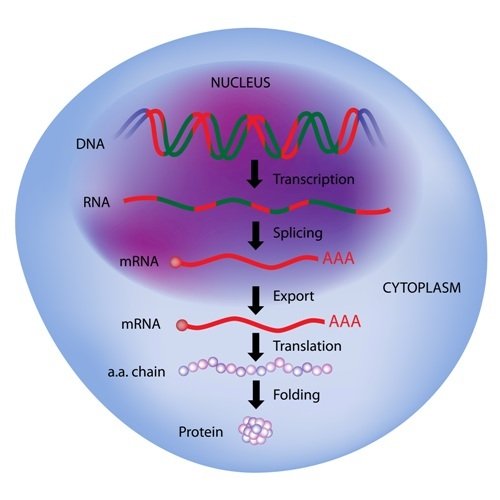Defective RNA Processing and Protein Folding May Promote ALS, Lab Study Suggests

Defects in RNA processing and transport, as well as protein folding, may contribute to amyotrophic lateral sclerosis (ALS) pathology, according to the results of recent research.
The study, “Altered nucleocytoplasmic proteome and transcriptome distributions in an in vitro model of amyotrophic lateral sclerosis,” was published in the journal PLOS One.
ALS is a fatal neurodegenerative disorder that affects mainly motor neurons. The mechanisms underlying the disease are not completely understood, but one – protein mislocalization – may play an important role in ALS. In fact, proteins that belong to the nucleus of cells but are wrongfully located outside of it, in the cytoplasm, are known to contribute to other neurodegenerative diseases.
Researchers investigated the changes in nuclear and cytoplasmic proteins in a lab culture model of ALS, using NSC34 motor neuron-like cell lines expressing wild-type (control) or mutant human SOD1 genes, the second most common cause of familial ALS.
They studied the changes in protein distribution of the proteome (a strategy that quantifies all proteins) and RNA sequencing analysis in both control and ALS-like motor neuron cells. Before, researchers performed what is known as subcellular fractionation, a process in which the cells are separated into their components — in this case separation of the cells’ nucleus from the cytoplasm.
“A total of 1,925 proteins were identified in either the nuclear or cytoplasmic fractions, and 32% of these proteins were quantified in both fractions,” researchers wrote. “The nucleocytoplasmic distribution of 37 proteins was significantly changed in mutant cells with nuclear and cytoplasmic shifts in 13 and 24 proteins, respectively.”
The set of proteins shifted in the nucleus belonged to a group involved in RNA transport and processing; those tending toward the cytoplasm included proteins related more to protein folding and two important signaling pathways.
The RNA sequencing analysis showed that a high proportion of transcripts (molecules obtained from genetic information) were retained in the nucleus of mutant cells. This suggests that ALS-like cells have defects in transport or deficient degradation in the cytoplasm.
Overall, these results suggest that pathways such as RNA processing and transport and protein synthesis and folding may be important for ALS disease.






